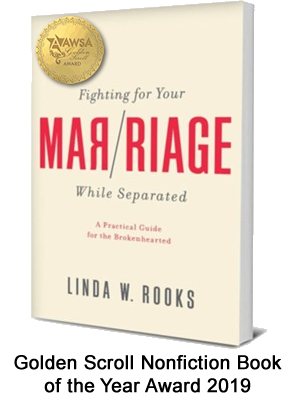For two years their fighting had escalated, with tension and bitterness mounting month after month. When Jim and Kelly were together physically, the emotional and spiritual distance between them gnawed at their insides. Each fight ended with Jim walking out the door and slamming it behind him. But he always came back.
“I can’t stand this anymore!” Kelly cried as Jim headed toward the door one evening during another argument. “You get mad at me, then leave. We never resolve anything. When you come back, you act like nothing happened. Well!” she announced in exasperation. “It’s not going to happen this time.”
And it didn’t. This time when Jim left, he didn’t return. It was six weeks later in a counselor’s office before they saw each other again.
While divorce and infidelity visibly tear Christian marriages apart, marital separation maintains a silent and growing presence in our churches and communities where many couples languish silently in the shadows. Usually perceived as a precursor to divorce, separation is the awkward stepchild that no one knows how to handle. Yet the numbers are staggering. According to the U.S. Census Bureau, more than 2.5 million couples were separated in the year 2000. A report from a Gallup poll translates the numbers into astounding percentages: “If you have ever been married, the odds are 50-50 that you’ve either been divorced, separated or seriously close to separation. If you’re between the ages of 35 and 54, those odds increase to two out of three.”
Marriage counselor Dr. Willard F. Harley, author of His Needs, Her Needs, maintains that 15 to 20 percent of married couples end their lives permanently separated.
Although these numbers reflect an enormous need, few churches know what to do for couples who separate.
“Everybody kept telling me to go to singles,” says Michelle Williams, who was separated from her husband for two years. “They kept talking about divorce recovery. And I kept telling people, including pastors, ‘But I’m not divorced. I’m not single. I’m married.’ But there was nothing for people who were separated.” The only place that offered any hope to someone who was separated was the singles program, and the hope you found there was in meeting singles who were divorced. So divorce became the only hope anybody offered.
Added to this lack of direction from churches is a general scarcity of resources for the separated in the larger marketplace. While a Christian bookstore might carry an entire shelf of books on divorce recovery, a customer is fortunate to find one book on surviving separation. The truth is, there is a huge gap in resources for married couples swimming through the murkiest of waters.
But the question lingering in the minds of most onlookers is, what real hope is there for couples once they separate? Isn’t it already too late? Isn’t the possibility of reconciliation extremely slim?
To the contrary: according to Howard Weinberg in the Journal of Marriage and the Family, one third of women who attempt to reconcile their marriages succeed in doing so. And somewhere in the fabric of the general population, 10 percent of currently married couples in the United States have experienced a separation and reconciliation at some point in their marriage. A report from the Department of Health and Human Services (DHHS) shows that almost half of those who separate do not divorce within the first year. Longer than three years, however, divorce is more likely.
Some suggest we view a separated couple as we would a friend diagnosed with cancer. With proper treatment, there is a good chance of recovery. Left alone, the marriage will probably not make it.
What people need is hope. “If you only have one friend who says, ‘I think you guys are going to make it,’ even one friend giving you that hope, it is light in a dark place,” says Dwight Bain, a licensed mental health counselor and certified family law mediator.
A couple who is left alone through a separation “is the saddest thing ever,” says Williams, who with husband Joe founded “Reconciling God’s Way,” a phenomenally successful program for those who are separated. “When you’re separated and all alone, without the right kind of counsel, your marriage will end in divorce.”
Reconciling God’s Way now reaches into 325 churches both nationally and internationally. According to the Williamses, the program achieves more than a 90 percent success rate for couples who go through it together and 50 percent for couples where just one participates. “At least 50 percent of the time,” they report, “when a couple separates, only one person is interested in working on it.” Consequently, one advantage of Reconciling God’s Way is one member of the couple can do it alone, and they can begin immediately. The program stresses having an accountability partner of the same gender while working through a workbook. Churches can work with one or both members of the couple individually, or hold classes where men and women sit on different sides of the room so that those without a willing spouse are comfortable attending.
Bridging the Gap Between Separation and Restoration
How then do we help couples through the mire of marital breakdown?
Steven W. Harley, M.S., son of Dr. Willard F. Harley and a specialist in infidelity counseling, sums up the reason for divorce in one word. “When it’s all boiled down,” he says, “the fact is that divorce is caused by hopelessness.”
Roger Shepherd, a licensed mental health counselor specializing in marriage and family counseling, agrees. “It is hopelessness that things will ever be different, that we will ever find what we’re looking for in this relationship. Then what feeds the hopelessness [in a separation] is you become more and more isolated, more and more alone. You find fewer and fewer places where you feel comfortable.”
“And if the only place you can find hope is in a singles class,” adds Michelle Williams, “where you’re meeting people who tell you, ‘Look, you’re going to be OK. I’m divorced, and I’m OK,’ then [separated people] begin to see their only hope in the form of a good divorce. People get separated out of frustration; the divorce becomes final out of hopelessness.”
And that’s where friends, pastors and counselors fit in.
Friends help when “they’re showing up and taking an interest,” says Shepherd. “I don’t mean coming in and telling them what to do, but coming in and giving them a safe place to be honest. That’s why I think counseling is so important; it’s a safe place. What bothers me,” Shepherd continues, “is that when people don’t know what to do, they don’t get involved. It’s just like, even when people are grieving the loss of a loved one, people don’t know what to do, so they tend to stay distant. That is the problem.”
“Give your friend hope,” advise the Williamses. “They’re in a situation where they’re feeling lonely and embarrassed, maybe embarrassed to go to church without their spouse. So you want to create an atmosphere for them where they can grow closer to the Lord. Go with them to church or Bible study or a retreat.”
Counselors agree this is not the time to arrange a date for them. Remember they are separated, not divorced. The worst thing you can do, says Dr. Jim Talley, is tell a separated person to “get on with your life.”
Probably the best news for separated couples is the emergence of couple mentoring programs that are turning marriages around in incredible numbers.
Retrouvaille, now in its 25th year, is “an extraordinary program that works miracles!” reports one couple whose marriage was successfully restored after a three-year separation. “It is so well planned, it enables your hearts to really connect again. I would recommend, before any couple divorces, they go to Retrouvaille. It will save their marriage.”
In fact, studies show a 75 percent success rate for couples who complete the program, even though at least a third are separated when they come to the weekend. “Some are even divorced,” report Roger and Pat Bate, the international coordinating couple. Retrouvaille consists of a weekend and six follow-up sessions led by peer couples whose own marriages have recovered from serious trauma. “The tools we give the couple provide them the opportunity to develop real closeness and intimacy,” says Bate, “a closeness that allows them to deal with issues from a posture of combined strength ‰ÞÓ couple strength. All of a sudden they find they’re successful in attacking the issues because they’re attacking them together rather than attacking one another.”
Separations That Heal
What may seem surprising is that many counselors actually recommend a short separation as part of the healing process for marriages in distress. Bain cites 1 Corinthians 7:5, which allows for a couple to be apart for the purpose of prayer and fasting, as a basis for a separation of up to 40 days. He derives the time period from the 40 days that Jesus fasted and prayed. “Longer than that,” the counselor says, “and I want to see extreme structure” so it does not become a precursor to divorce. For couples who need a longer separation, he drafts a contract between the husband and wife, outlining how money will be handled, how often they will see each other, and parenting responsibilities. “Separation is for the purpose of restoration, not a prelude to divorce,” Bain says. “It is about building a new relationship between the two parties. It’s a time for each of them to deal with the hardness in their hearts so they can save the marriage.” Bain typically structures a separation from one to six months.
Perhaps the biggest question is, who makes it through a separation and who doesn’t?
A disturbing DHHS statistic shows separations more likely turn into divorce for Protestant Christians than for Catholics and non-Christians. Why? Bain suggests a serious reason many Christian couples fail to reconcile is that “they’re embarrassed to seek help. Couples need to break through that embarrassment and realize healthy people seek help. Even one person can get help to save a relationship from a relationship cancer.”
And for those who do get help, what is the secret of restoring a torn-apart marriage?
“The number one thing,” say the Williamses, “is that they learn to take their focus off their spouse to meet all their needs. They get their focus on God, get the log out of their own eye, begin working on their own individual issues, and wait to see what God does.”
For those who reconcile then, what is the prognosis? Are they happy, or do they just endure each other?
Bain does not hesitate. “I think the ones who truly have let God change their hearts are the happiest people on the planet. Because now they have the marriage of their dreams. They just don’t have the baggage of a broken and failed marriage.”
First appeared in Light and Life Magazine, May/June 2003







